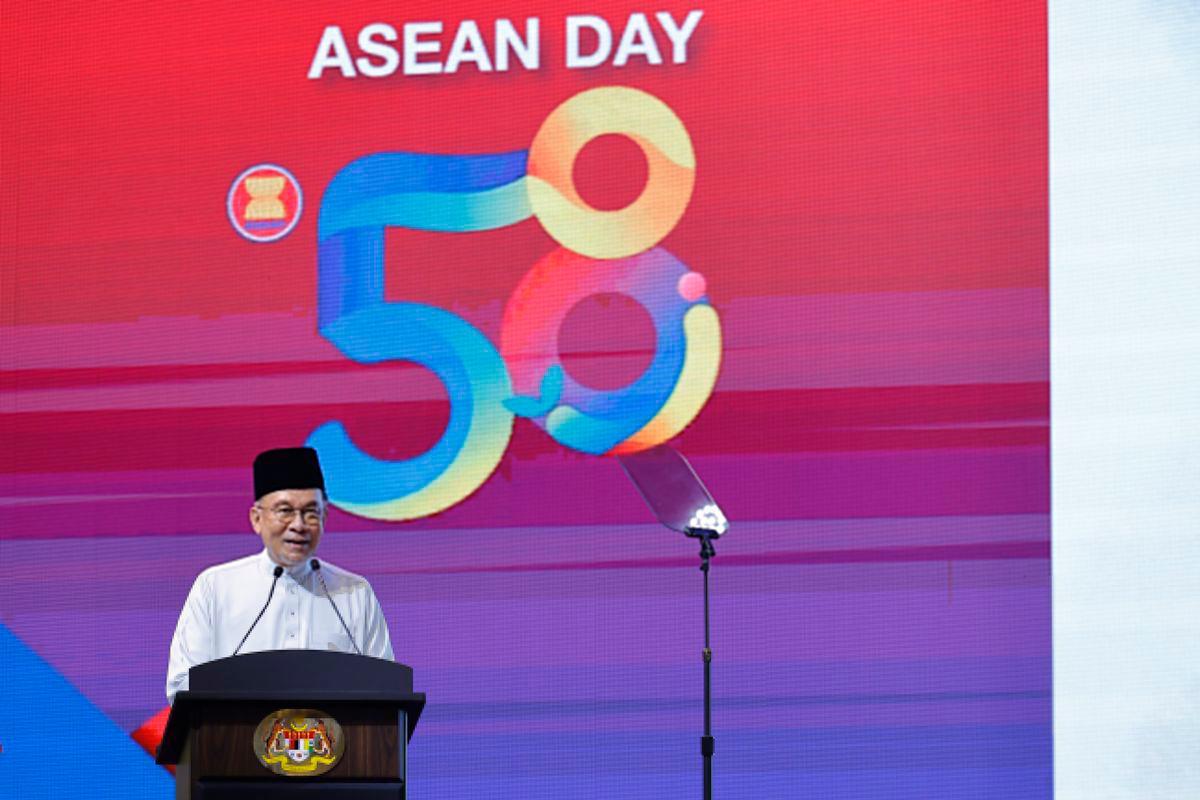CYBERJAYA: United States President Donald Trump, Chinese President Xi Jinping, Brazilian President Luiz Inácio Lula da Silva and South African President Cyril Ramaphosa are among the world leaders expected to attend the 47th ASEAN Summit in Malaysia this October, said Prime Minister Datuk Seri Anwar Ibrahim.
Anwar, who represents Malaysia as ASEAN Chair, said positive confirmations have been received from Lula and Ramaphosa, while Trump has indicated his participation following a recent phone conversation.
“Securing their presence is only the first step. The greater test is to ensure that they leave Malaysia and ASEAN feeling their time was well spent. We must ensure that their visit yields results of lasting value. The eyes of the world will be upon us. We must therefore rise to the occasion,” he said.
Anwar said this in his address at the 58th ASEAN Day celebration here today, held in conjunction with the 58th anniversary of the founding of the Association of Southeast Asian Nations (ASEAN), themed Towards an Inclusive and Sustainable ASEAN Future.
The Prime Minister said anniversaries are moments to reassess and reflect on how far the bloc has come and the journey ahead.
Malaysia, as ASEAN Chair for 2025, will host the summit in Kuala Lumpur under the theme “Inclusivity and Sustainability”, bringing together leaders from the 10-member bloc and dialogue partners to discuss regional security, economic cooperation and pressing global issues.
Anwar said the vision and contributions of past leaders, who looked beyond domestic concerns to consider the needs of neighbouring countries, the region and the world, remained relevant despite the post-independence challenges and geopolitical tensions faced.
“And I dare say without the least overstatement that the founders of ASEAN will look to our progress with pride,” he said.
However, he stressed that ASEAN must not think it had outgrown the motivations and concerns of those who signed the Bangkok Declaration in 1967 — Adam Malik (Indonesia), Tun Abdul Razak (Malaysia), Narciso Ramos (the Philippines), S. Rajaratnam (Singapore) and Thanat Khoman (Thailand).
“The founding fathers of ASEAN understood that the region’s first task was to ensure that nations of Southeast Asia could live together in amity and cooperation. They also recognised that Southeast Asia must take primary responsibility for its own peace, its own security, and its own prosperity. That conviction still beats at the heart of ASEAN,” he said, adding that the principle remained relevant today.
“Peace between nations, peace within them — these are the foundations of our regional community. We must not take them for granted, nor can we set aside our responsibility to forge regional solutions to regional problems,” he emphasised.
Citing the recent escalation along the Cambodian-Thai border, Anwar said it was a reminder of how swiftly tensions could rise when left unresolved.
He said the ceasefire agreement between the two neighbouring countries was achieved because of the full support and solidarity of all ASEAN leaders.
“As Chair, Malaysia has worked constructively to facilitate talks between the two countries. I would like to recognise the support and mandate of my friends, the Sultan of Brunei (Sultan Hassanal Bolkiah), presidents, and prime ministers in ASEAN who have continuously given their full support and endorsement, and this is a remarkable feat,” he said.
ASEAN was established on Aug 8, 1967 in Bangkok, with the signing of the Bangkok Declaration by its five founding members – Indonesia, Malaysia, the Philippines, Singapore and Thailand – represented by their foreign ministers Adam Malik, Tun Abdul Razak, Narciso Ramos, S. Rajaratnam and Thanat Khoman.
It was formed to promote regional peace, stability and cooperation amid post-colonial challenges and Cold War tensions. Its membership has since expanded to 10 countries, with Brunei joining in 1984, Vietnam in 1995, Laos and Myanmar in 1997 and Cambodia in 1999. Timor-Leste was admitted in principle in 2022 and is undergoing the membership process.
Today, ASEAN has a combined population of over 680 million and a GDP exceeding USD3.6 trillion (2024), making it the world’s fifth-largest economy. It works through consensus and non-interference, focusing on political-security cooperation, economic integration and socio-cultural collaboration under the ASEAN Community framework established in 2015.
Among those present at the event were Foreign Minister Datuk Seri Mohamad Hasan and Chief Secretary to the Government Tan Sri Shamsul Azri Abu Bakar. - Bernama









